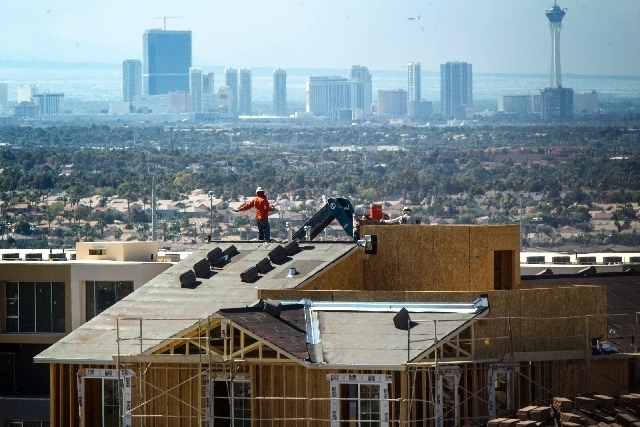New-home sales healthier in Las Vegas than rest of U.S.
WASHINGTON — Americans cut back sharply in July on their purchases of new homes, a sign that higher mortgage rates may slow the housing recovery.
U.S. sales of newly built homes dropped 13.4 percent to a seasonally adjusted annual rate of 394,000, the Commerce Department said Friday. That’s the lowest in nine months. And sales fell from a rate of 455,000 in June, which was revised down from a previously reported 497,000.
The housing rebound that began last year has helped drive economic growth and create more construction jobs. But mortgage rates have climbed a full percentage point since May. The increase has begun to steal some momentum from the market.
Sales of new homes are still up 7 percent in the 12 months ending in July. Yet the annual pace remains well below the 700,000 that is consistent with a healthy market.
New-home sales were healthier in Las Vegas, though still well below their pre-recession norms.
July sales jumped to 651, up nearly 41 percent from 462 closings in the same month a year earlier, according to new numbers from Home Builders Research. Sales also ticked up month to month, rising 2.2 percent from 637 sales in June.
But before the downturn, local builders routinely closed on 3,000 units a month.
Local new-home sales have gained in the last year as the inventory of resales available through foreclosure or short sale has dwindled.
Since May, when interest rates started increasing, new-home sales in Las Vegas have slumped 6.5 percent. What’s more, the number of sales per new-home subdivision has fallen since late July, dropping from a weekly average of one sale to a half of a sale.
Dennis Smith, president and CEO of Home Builders Research, said price gains of 20 percent to 30 percent in the last six months, coupled with a normal late-summer sales drop as families get ready for a new school year, could be behind the sales drop of the last three weeks.
Nationally, July’s nationwide drop “may mark an uh-oh kind of moment for the housing recovery,” said Mark Vitner, an economist at Wells Fargo Securities.
Homebuilder stocks declined sharply Friday, even as overall market indexes rose. Shares of Toll Brothers Inc., D.R. Horton Inc. and Lennar Corp. — three of the nation’s largest builders — all sustained losses for the day.
And major homebuilders’ shares have been dropping steadily since late May. The slide began after Federal Reserve Chairman Ben Bernanke first signaled that the Fed might reduce its bond purchases later this year. The bond purchases have helped keep mortgage rates and other borrowing costs low.
The average rate on a 30-year mortgage reached 4.58 percent this week, according to Freddie Mac. That’s up from 3.35 percent in early May and the highest in two years.
The impact on would-be buyers’ finances is significant.
Take someone who locked in the early May rate on a $200,000 mortgage. They would have a monthly payment of around $875. But the same mortgage at last week’s average rate would cost $1,025 a month.
The difference adds up to $150 more each month — or $54,000 over the lifetime of a 30-year loan. The monthly figures don’t include taxes, insurance or initial down payments.
Potential buyers appear to have noticed that financing a home purchase has become more expensive. The number of Americans applying for mortgages to buy homes has plummeted 16 percent since the end of April. And builders began work on the fewest single-family homes in eight months in July.
Still, mortgage rates remain low by historical standards. The same $200,000 loan would cost a buyer $1,330 a month at a 7 percent rate, the average since 1985.
Most economists expect the housing recovery will continue, albeit at a slower pace.
“We’ve been spoiled by low rates,” Greg McBride, senior financial analyst at Bankrate.com. “People are gnashing their teeth now over a rate we had never seen four years ago.” He notes that, based on their figures dating back to 1985, rates on the 30-year loan had never sunk below 5 percent until 2010.
Review-Journal writer Jennifer Robison contributed to this report.






















